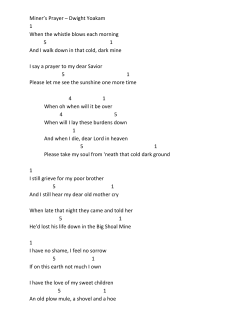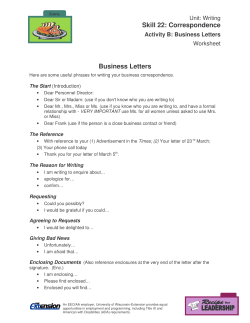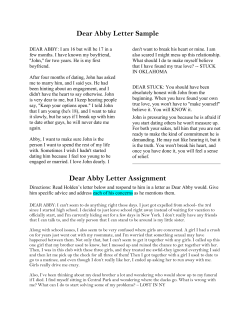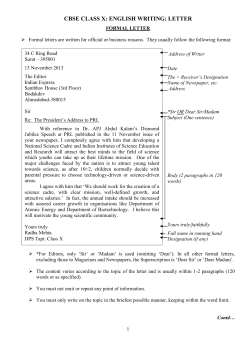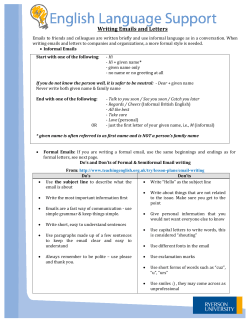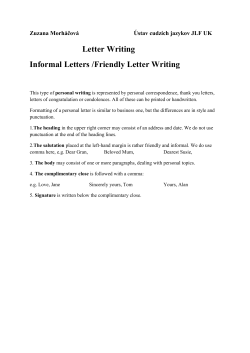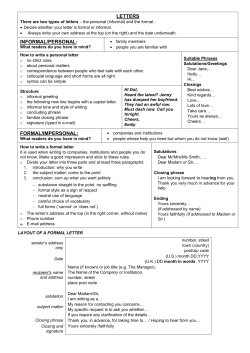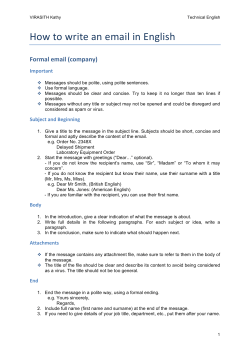
FAQs on the Rules of Business Writing By Lynn Gaertner-Johnston
FAQs on the Rules of Business Writing By Lynn Gaertner-Johnston If you are quarreling about such questions (if only with yourself), take a break. Here are the answers to a variety of troublesome frequently asked questions (FAQs). However, / In addition, we still hope to sign a contract. Nevertheless, / Furthermore, we still hope to sign a contract. Question 3. Isn’t it unacceptable to start a sentence with the word because? Answer: It is fine to start a sentence with because. Because we appreciate our relationship with you, I want to personally explain a change in our delivery policy. Writing teachers often forbid students from starting sentences with because in order to teach them to avoid sentence fragments like the one below. pl Question 1. Is it acceptable to end a sentence with a preposition? Answer: Yes, ending a sentence with a preposition is correct, but ending a sentence without one sounds more formal. Choose the tone that is suitable for your situation. e In offices across the globe, writers spend time and energy disputing business writing standards. One person says, “You can’t start a sentence with but or and!” Another responds, “But why not? And who says?” Sa m Examples ending with a preposition: That is something we had not thought of. Where is this catalog from? Type the name you want to search for. Examples with a more formal tone: That is something we had not considered. Which company produces this catalog? Type the name for which you want to search. Question 2. Is it acceptable to start a sentence with and or but? Answer: It is perfectly acceptable to begin a sentence with and or but. However, other words sound more formal. If formality is your goal, choose formal language. But / And we still hope to sign a contract. © 2009 Syntax Training. All rights reserved. I was not able to complete the assignment. Because the anthropologist did not return my phone call. Question 4. Should one space or two come after a colon and after end punctuation such as a period? Answer: Just one space comes after a colon and after end punctuation. However, in rare situations where one space seems too small (for example, with italic type), it is wise to insert an additional space. Question 5. Is it clumsy to begin a sentence with “There is” or “There are”? Answer: There are many fine reasons to begin a sentence with these words, and this sentence is an example. Although people who majored in journalism have been taught to cut right to the true subject and verb, at times “there is” and “there are” fit perfectly. Each of these sentences has its place: There is an interview scheduled at 3 p.m. An interview will take place at 3 p.m. An interview has been scheduled at 3 p.m. www.syntaxtraining.com | 1 I am writing to express my deep sympathy . . . . I am writing to inform you of a change in . . . . Here is a place to drop the expression: I am writing to Thank you for your generous contribution. Question 7. Is it wrong to use I and we in the same message? It seems inconsistent. Answer: While it may be confusing to use I and we in the same sentence, it is fine to include both pronouns in one message, even in the same paragraph. Examples: Dear Mr. Cho: Dear Hiring Manager: Question 11. Do I have to use “Dear” in email? Answer: If you are sending email in place of a formal business letter to someone outside your organization, use the same greeting you would use in a business letter, that is, “Dear.” For messages within your company (and for friendly messages to the outside world), address the reader politely in the first sentence, like this: Lee, here are the reports. I was very pleased to get your message. We are delighted you have accepted our offer. Or use one of these ways, with the message following beneath: Sa m We are looking forward to working with you on the project. I will phone you next week to plan our first meeting. pl Question 10. Do I have to begin a business letter with “Dear”? Answer: Yes. If you use a person’s name or title in a greeting, you must use “Dear” before it. As a letter opener, “Dear” is not an expression of affection; it’s a business custom. e Question 6. Is it bad form to begin a message “I am writing to”? Isn’t it obvious? Answer: It isn’t bad form. Although sometimes “I am writing to” is unnecessary baggage, at other times it allows us to ease into the subject: When you are speaking for yourself, use I. When you speak for the team or the company, use we. Question 8. Is it true that one should never start a sentence with I? Answer: Not true! It is perfectly acceptable to start a sentence with I. However, as with all good writing, it is inelegant to start sentence after sentence with the same word. In much scientific writing, personal pronouns (I, we, they, you, etc.) are avoided. Check the style guide used by your editor or readers. Question 9. Is it okay to have a paragraph with just one sentence? Answer: Yes, despite the common three-sentence requirements of composition teachers, one-sentence paragraphs are effective in business writing. In fact, they are the best choice for action items and other content that must stand out. Lee, Lee: Hi, Lee, Hello, Lee, Dear Lee, Question 12. Are contractions acceptable? Answer: Yes, it’s acceptable to use contractions such as it’s, didn’t, and don’t. However, they are considered slightly informal, so avoid them in formal documents. And as with any language choice, avoid choosing them constantly. Question 13. What if my supervisor disagrees with these answers? Answer: The goal in business writing is to communicate with your reader. Your supervisor is one of your readers. If he or she dislikes the word but as a sentence opener, avoid using it. But why not bring out an excellent reference manual, and try to do some supervisor development? When questions arise, consult a current, respected style manual. For recommendations with brief descriptions, visit the Syntax Training website at http://syntaxtraining.com/recommended_books.html. Do not copy, reprint, or distribute this material without written permission. www.syntaxtraining.com | 2
© Copyright 2025
